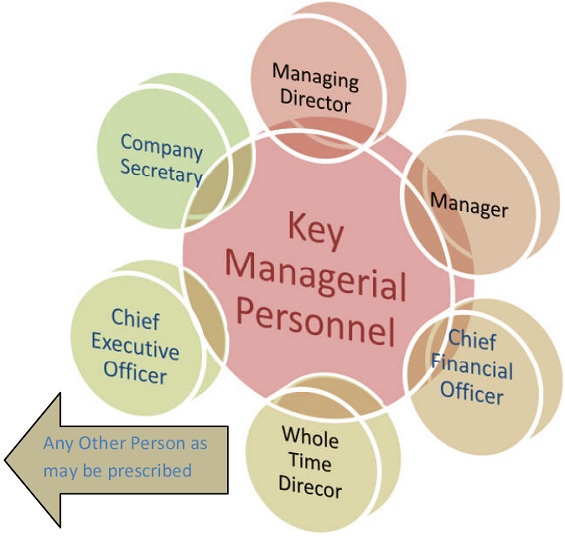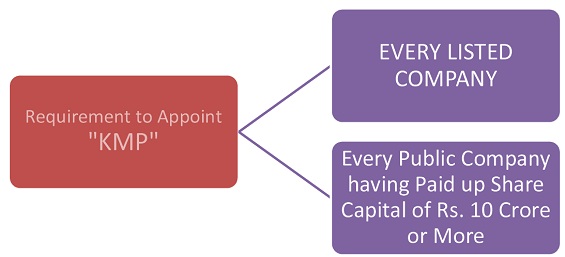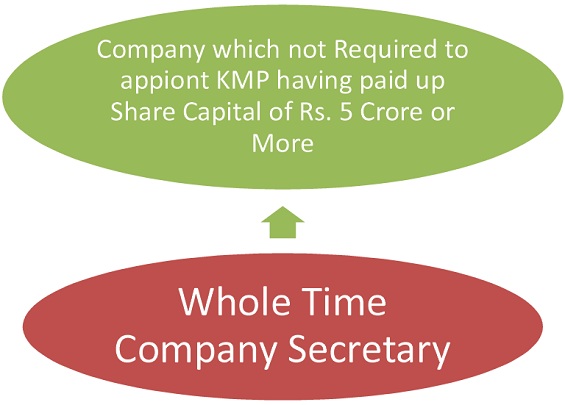CS Divesh Goyal

Key Managerial Personnel -Section 203 read with rule 8 of Companies (appointment and remuneration) Rules, 2014
Companies Act, 2013 (Act) has introduced many NEW CONCEPTS AND KEY MANAGERIAL PERSONNEL is one of them. While the Companies Act, 1956 recognised only Managing Director, Whole Time Director and Manager as the Managerial Personnel, the Companies Act, 2013 has brought in the concept of Key Managerial Personnel which not only covers the traditional roles of managing director and whole time director but also includes some functional figure heads like Chief Financial Officer and Chief Executive Officer etc. These inclusions are in line with the global trends.
“Company Secretary” has also been brought within the ambit of Key Managerial Personnel giving them the long deserved recognition of a Key Managerial Personnel of the Company. Another noteworthy feature of this concept is that it combines the important management roles as a team or a cluster rather than as independent individuals performing their duties in isolation to others.
Let’s First Discuss the Definition/ word Key Managerial Personnel:
General Meaning: The term key management personnel includes those people having authority and responsibility for planning, directing, and controlling the activities of an entity, either directly or indirectly.
Key management personnel are employees who have the authority to directly or indirectly plan and control business operations. The term key management personnel is a relative term dealing with specific operations.
As per Companies Act, 2013: Under Companies Act, 2013 Definition of “Key Managerial Personnel” given under Section- 2 sub section- 51. As per this Key managerial personnel includes following:
 The above definition is an exhaustive definition but point number (v) gives the power to the legislature to include some other personnel also within the definition of Key Managerial Personnel as may be deemed fit by them from time to time. As of now, no further prescription has been made pursuant to point number (v) and therefore, as on date, the definition is confined to the six personnel mentioned above.
The above definition is an exhaustive definition but point number (v) gives the power to the legislature to include some other personnel also within the definition of Key Managerial Personnel as may be deemed fit by them from time to time. As of now, no further prescription has been made pursuant to point number (v) and therefore, as on date, the definition is confined to the six personnel mentioned above.
Let’s Discuss the Definitions the definitions of all Six terms used in definition of Key Managerial Personnel:
COMPANY SECRETARY: As per Section 2 sub section 24 of Companies Act, 2013
Company Secretary‖ or ―secretary‖ means a company secretary as defined in clause (c) of sub-section (1) of section 2 of the Company Secretaries Act, 1980 who is appointed by a company to perform the functions of a Company Secretary under this Act;
As per Company Secretary Act, “Company Secretary” means a person who is a member of the Institute of Company Secretary of INDIA.
MANAGING DIRECTOR: – As per Section 2 sub section 54 of Companies Act, 2013
A director who, by virtue of the articles of a company or an agreement with the company or a resolution passed in its general meeting, or by its Board of Directors, is entrusted with substantial powers of management of the affairs of the company and includes a director occupying the position of managing director, by whatever name called.
MANAGER:- As per Section 2 sub section 53 of Companies Act, 2013
An individual who, subject to the superintendence, control and direction of the Board of Directors, has the management of the whole, or substantially the whole, of the affairs of a company, and includes a director or any other person occupying the position of a manager, by whatever name called, whether under a contract of service or not.
WHOLE-TIME DIRECTOR: – As per Section 2 sub section 54 of Companies Act, 2013
A director in the whole-time employment of the company.
CHIEF FINANCIAL OFFICER: As per Section 2 sub section 19 of Companies Act, 2013
A person appointed as the Chief Financial Officer of a Company. Generally a person who leads the finance and treasury functions of a business enterprise is designated as “CFO”. The person appointed as the CFO under this Act is also considered as a Key Managerial Personnel (KMP). a CFO of the company should be a person who is appointed as a CFO and not engaged in any other manner (retainer or consultant) or by any other designation.
CHIEF EXECUTIVE OFFICER: As per Section 2 sub section 18 of Companies Act, 2013
A person appointed as the Chief Executive Officer of a Company.
COMPANIES WHICH REQUIRED TO APPOINT “KEY MANAGERIAL PERSONNEL”
Following Companies are required to appoint KMP;  COMPANY SECRETARY:
COMPANY SECRETARY:
Further, as per recently notified Rule 8A of the Companies (Appointment and Remuneration of Managerial Personnel) Rules, 2014, a company other than a company which is required to appoint a whole time key managerial personnel as discussed above and which is having paid up share capital of Rs. 5 Crores or more shall have a whole time Company Secretary. 
 RESTRICTIONS REGARDING APPOINTMENT OF KEY MANAGERIAL PERSONNEL:
RESTRICTIONS REGARDING APPOINTMENT OF KEY MANAGERIAL PERSONNEL:
♣ Holding of Office in other Companies by Whole Time Key Managerial Personnel (KMP)
- It has been provided under the Act that a whole-time key managerial personnel shall not hold office in more than one company at the same time, except:
QUESTION 1: Whether MD, WTD & Manager can be appointed as Director in any other Company.
ANSWER: As per My View:
As per Third Proviso to Sub Section 3 of Section 203
Sub Section 3 of Section 203:
BARE ACT LANGUAGE:
“Nothing contained in this sub-section shall disentitle a Key Managerial from being a director of any Company with the permission of the Board.”
AS PER MY KNOWLEDGE:
As PER Sub Section 3 of Section 203:
A Key Managerial Personnel can be appointed as Director in other Companies if he fulfill the following Condition:
- Before appointment as Director, KMP requires permission of Board of Directors of Company.
- By passing of Board Resolution in the company in which he is KMP.
CONCLUSION:
Therefore, it is clear from above clarification that “KMP CAN BE APPOINTED AS POSITION OF DIRECTOR IN OTHER COMPANIES”
QUESTION 2 – Can KMP Can be Appointed in Subsidiary Company?
ANSWER- KMP Can be appointed as KMP in the Subsidiary Company.
QUESTION 3 : Can a person be Managing Director in two companies?
ANSWER: As per My View:
As per 203 of Companies Act, 2013
Sub Section 3 of Section 203:
BARE ACT LANGUAGE:
A company may appoint or employ a person as its managing director, if he is the managing director or manager of one, and of not more than one, other company and such appointment or employment is made or approved by a resolution passed at a meeting of the Board with the consent of all the directors present at the meeting and of which meeting, and of the resolution to be moved thereat, specific notice has been given to all the directors then in India.
AS PER MY KNOWLEDGE:
As PER Sub Section 3 of Section 203:
→ A company may appoint or employ a person as its MD, if he is the MD or Manager of one and not more than one other company.
{Such person should not be MD in more than one Company at the time of appointment, But he can be Director in any no. of Company as allowed by Companies Act, 2013. His Directorship in other Companies will not affect his appointment as MD in second Company.
→For Such appointment:
- Specific Notice of Meeting has been given to all the directors then in India.
- Such appointment or employment is made or approved by a resolution passed at a meeting of the Board with the consent of all the directors present at the meeting. (Unanimous Resolution)
{Resolution by Circulation will not work in this situation.
CONCLUSION: Therefore, it is clear from above clarification that “A PERSON CAN BE A MANAGING DIRECTOR IN TWO COMPANIES”.
CHAIRPERSON OF THE COMPANY CANNOT BE MANAGING DIRECTOR OR CEO
In all the advanced Economies of the World there is a clear demarcation in the responsibilities of the Chair person of the Company in that he is expected to occupy only a non-executive position on the Board. This philosophy has also been advocated in the voluntary guidelines on corporate governance issued by the Department of Company Affairs in the year 2010.Taking a cue from the above, legal sanction to this ethos has been accorded in Section 203 of the Act.
Except in cases where the Articles of the Company ordain otherwise or where the company carries on multiple businesses, the chairperson of the company should not be appointed as the Managing Director or the CEO of the company. This is a welcome provision as it will ensure that there is no conflict of interest arising out of the same person acting as the Chairman and Managing Director of the company.
In case of a company which has multiple lines of business in respect of which CEOs have been appointed for each line, the chairperson can play the dual role of being the CEO of the company as well. MCA has vide its notification dated July 25, 2014 clarified that those public companies which have a paid up share capital of Rs.100 Crore or more and an average turnover of Rs 1000 Crore or more and which are engaged in multiple businesses and have appointed chief Executive officers for each such business can have a chairperson who is also holding the position of the CEO in the company.
A CEO need not be a Director of the Company
In addition to the above, it is pertinent to note that the Act also contains specific definitions to the terms ”Chief Executive Officer” and “Chief Financial Officer”.
As per Section 2(18) a CEO , refers to an officer of the company who has been designated as such by it. From the above definition it follows that a person designated by the company as CEO need not be a Director of the Company although in Section 203 he is equated with Managerial persons such as the
Managing Director, the Manager or in their absence, the Whole time Director. The remuneration payable to the CEO shall not be subject to regulation under Section 197 of the Act read with Schedule V in the Act , unless he is part of the Board or he is appointed as a Manager in addition to his designation as CEO.
MANNER OF APPOINTMENT OF KMP:
Below given is procedure for appointment of Key Managerial Personnel:
STEP-I
Convene A Board Meeting: To alter the object clause in memorandum of association of Company By giving Notice of at least 7 days.
STEP: II
Hold the Board Meeting:
- At the Board meeting pass a resolution for appointment of Key Managerial Personnel.
- Such Board Resolution must be subject to approval of Share holder.
- Get the Approval of Shareholder for such Appointment in subsequent General Meeting.
STEP: III
Filing and fees:
I) File FORM NO. MGT-14
(Filing of Resolutions to the Registrar under section 179(3) Rule 8(2) and Section 117(3) (c) ) with the Registrar along with the requisite filing within 30 days of passing the Board resolution, along with given documents:-
- Certified True Copies of the Board Resolutions;
- Appointment agreement of KMP
II) File FORM NO. DIR-12:- (Filing of particulars of appointment to the Registrar under section 15 Rule 8) with the Registrar along with the requisite filing within 30 days of passing the Board resolution, along with given documents:-
- Appointment Letter
- DIR-2 “Consent of Director”
- DIR-8 “Non Disqualification of Director”
- Directorship in other Companies
III) File FORM NO. MR-1:- (Filing of Return of Appointment to the Registrar under section 196 Rule 3) with the Registrar along with the requisite filing within 60 days of passing the Board resolution, along with given documents:-
- Certified true copy of Board Resolution
- Copy of letter of consent to act as a managing director, whole time director, or manager
MANNER OF APPOINTMENT OF CS, CFO, CEO:
Below given is procedure for appointment of Managerial Personnel:
STEP-I
Convene A Board Meeting: To appoint CS, CFO and CEO By giving Notice of at least 7 days.
STEP: II
Hold the Board Meeting:
- At the Board meeting pass a resolution for appointment of CS, CFO And CEO.
STEP: III
Filing and fees:
1. File FORM NO. MGT-14
(Filing of Resolutions to the Registrar under section 179(3) Rule 8(2) and Section 117(3) (c) ) with the Registrar along with the requisite filing within 30 days of passing the Board resolution, along with given documents:-
- Certified True Copies of the Board Resolutions;
- Appointment agreement of KMP
2. File FORM NO. DIR-12:- (Filing of particulars of appointmentto the Registrar under section 15 Rule 8) with the Registrar along with the requisite filing within 30 days of passing the Board resolution, along with given documents:-
- Appointment Letter
- DIR-2 “Consent of Director”
- DIR-8 “Non Disqualification of Director”
- Directorship in other Companies
3. File FORM NO. MR-1:- (Filing of Return of Appointment to the Registrar under section 196 Rule 3) with the Registrar along with the requisite filing within 60 days of passing the Board resolution, along with given documents:-
- Certified true copy of Board Resolution
- Copy of letter of consent to act as a CS, CEO and CFO.
FAQ’S
Whether provisions related to the Managerial Remuneration are applicable on all KMPs?
Ans: Section 203 of the COMPANIES ACT, 2013 provides that certain class of companies [refer rule 8 and 8A of the Companies (Appointment and Remuneration of Managerial) Rules, 2014] are required to appoint following whole time KMP:-
- Managing Director or Chief Executive Officer or Manager and in their absence whole-time director;
- Company Secretary; and
- Chief Financial Officer
Section 197 and Schedule V to the COMPANIES ACT, 2013. Section 197 prescribes certain caps and compliance only in regard to the remunerations of Directors including MD, WTD and Manager.
Therefore, the provisions related to the managerial remuneration are not applicable on all KMPs but they are applicable only on such managerial personnel as mentioned in Section 197 and Schedule V to the COMPANIES ACT, 2013. Therefore, CS and CFO not being managerial personnel as mentioned in Section 197, the provisions of Section 197 will not apply on them.
SITTING FEES.- A company may pay a sitting fee to a director for attending meetings of the Board or committees thereof, such sum as may be decided by the Board of directors thereof which shall not exceed one lakh rupees per meeting of the Board or committee thereof: Provided that for Independent Directors and Women Directors, the sitting fee shall not be less than the sitting fee payable to other directors.
OTHER PROVISIONS REGARDING KMP
♣Tenure:
Appointment of Managing Director, Whole – Time Director or Manager shall not for a term exceeding five years at a time.
♣Re-appointment:
The company may re-appointment them for next term before expiry of their present term but not earlier than one year before expiry of the current term. This means, company may re-appoint them for next term in last one year of current term.
♣ DISQUALIFICATION FOR APPOINTMENT OF MD, MANAGER OR MANAGER: No Company shall appoint or continue the employment of any person as
| On Company: | Fine which shall not be less than Rs. 1,00,000/- but which may extend to Rs. 5,00,000/- |
| On every director and key managerial personnel of the company who is in default | Fine which may extend to Rs. 50,000/- and where the contravention is a continuing one, with a further fine which may extend to Rs. 1,000/- for every day after the first during which the contravention continues. |
NOTES:
- A KMP is included within the meaning of “Officer in Default” under the Act.
- A document or proceeding requiring authentication by a company; or contracts made by or on behalf of a company, may be signed by any key managerial personnel or an officer of the company duly authorized by the Board in this behalf.
- Details regarding KMP, changes therein and the remuneration paid to them are required to be disclosed in the Annual Return of the Company
- Explanatory statement should disclose the nature of concern or interest, financial or otherwise, of every key managerial personnel, in respect of each items of special business to be transacted at a general meeting
- A person whose relative is employed as a KMP in a company is disqualified to be appointed as auditor in that company
- Company is required to maintain a register of the KMPs at its registered office containing particulars which shall include the details of securities held by each of them in the company or its holding, subsidiary, subsidiary of company’s holding company or associate companies.
- A return of every appointment and change in KMP has to be filed with the ROC within 30 days of the appointment or the change as the case may be
- The key managerial personnel shall have a right to be heard in the meetings of the Audit Committee when it considers the auditor’s report but shall not have the right to vote.
(Author – CS Divesh Goyal, ACS is a Company Secretary in Practice from Delhi and can be contacted at [email protected])






There is mandatory requirement for Appointment of CEO in producer company. Is the above procedure same to producer company?.
What’s is tenure of CEO?
Is MR-1 compulsory in case of CEO?
Our company is a Public Sector undertaking having share capital of Rs.120 crores and listed company the shares are traded in BSE. Recently the company
has decided the CFO on consultancy basis. Is the engagement of CFO on consultancy has legal bearing on Direcrors decision. Kindly through some light on engaging a person on consultancy for the post of CFO.
can you throw some light on the following :
If a person is not appointed as CFO as per the above provisions, is he authorised to sign the Balance Sheet?
and if he does, will his signature be valid ?
In your section you have not included CEO under exemption from applicability of Section 197 & Sch V.
can a consultant be a CEO ?
Can CEO /kmp can hold shares of the company..?
It is really helpful article can you please suggest me how to draft appointment of KMP
it is really helpful can u please suggest how to draft appointment of KMP. It will be pleasure
Nope.. it is not possible.. the same person cannot hold multiple positions in the company.
Dear Sir,
if i appoint whole time cs in holding company and subsidiary company also require whole time company secretary can i appoint same cs (which i already appoint in holding company ) in subsidiary company kindly give your opinion
~ Shareholders Meeting Approval not required for appointment of CS, CFO & CEO.
~ MOA point may be a cut/paste error, since not required.
a CFO of the company should be a person who is appointed as a CFO and not engaged in any other manner (retainer or consultant) or by any other designation. –
The above seems to be a view of the Author but not supported by any Act.
A consultant can be appointed as CFO, if not ., please specify where it is mentioned
Regards
can one person be appointed as a whole time company secretary and internal auditor at the same time in a private limited company
Hellow All,
I have one query regarding employment of KMPs viz. CFO and CS. Can employee of Company A (a Group Company) be appointed as CFO or CS in company B (other Group Company) without transferring payroll from Company A?
can director of company be appointed as CFO and director (finance). if yes please provide the reference in the company act 2013
Is Filing of Returns required for already appointment CS (appointed in 2011) designated KMP in Board meeting held after 01.04.2014
Its is a Great Article. Really very helpful.
Thanks
Can a practicing CA work as a CFO of a listed company as a consultant??
Can a practicing CA become a CFO as a consultant??
by what time the MD, CFO AND CS SHOULD BE APPOINTED BY THE COMPANY…………. COOLLING PERIOD FOR THE COMPANIES
Neha….Its is a Great Article. Really very helpful.
Thanks
CAN A KEY MANAGERIAL PERSON CAN BE AN INTERNAL AUDITOR??
IF YES PLZ MENTION THE SOURCE
A private company – G, appointed its MD in 2011 without mentioning any period of appointment. The original resultion was filed with the Registrar of Copmpanies.
Now he completes 5 years in 2016. Under the provisions of the Companies Act 2013, whether G would be required to appoint / re-appoint the the MD against in 2016.
Good article. I have a query that if a company appoints a whole-time CS under Rule 8A, then is he a KMP and whether Form MR-1 needs to be filed for him ? It may be noted that Rule 8A applies to the Companies which are not required to appoint KMPs but only a whole-time CS. Would appreciate your views.
In the procedure part the author has mentioned that the appointment of KMP is subject to approval of the shareholders. I do not agree with this point as far as appointment of CEO, CFO and a company Secretary are concerned. In my knowledge the law no where requires ratification of the members for appointments made of these KMPs. Other readers may also give their views on this.
Thank you Sir
Very helpful article. Thanks a lot.
1. Why is a board meeting required to be convened for alteration of object clause of MoA in case of appointment of KMP?
2. Why is KMP appointment required to be taken to general meeting (shareholder approval) , if CEO / CFO / Cs (not being directors is being appointed?
Thnx..